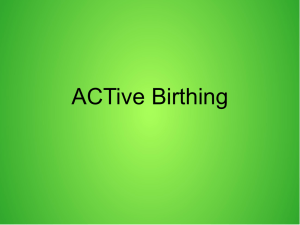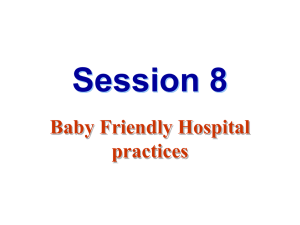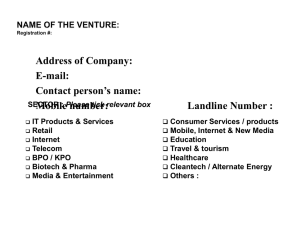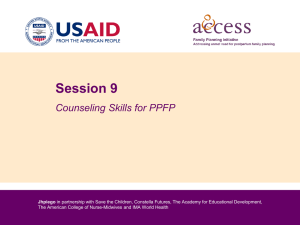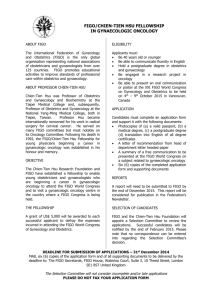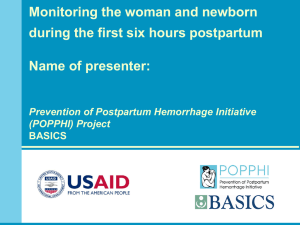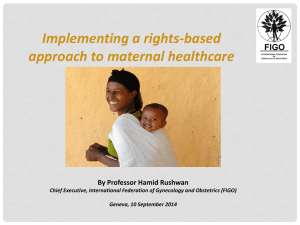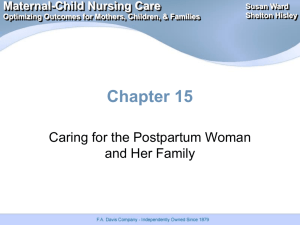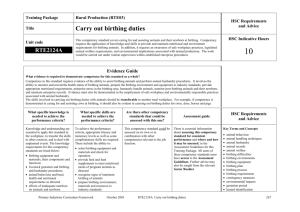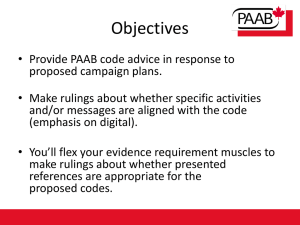Mother and Newborn Friendly Birthing Facility (2014)
advertisement
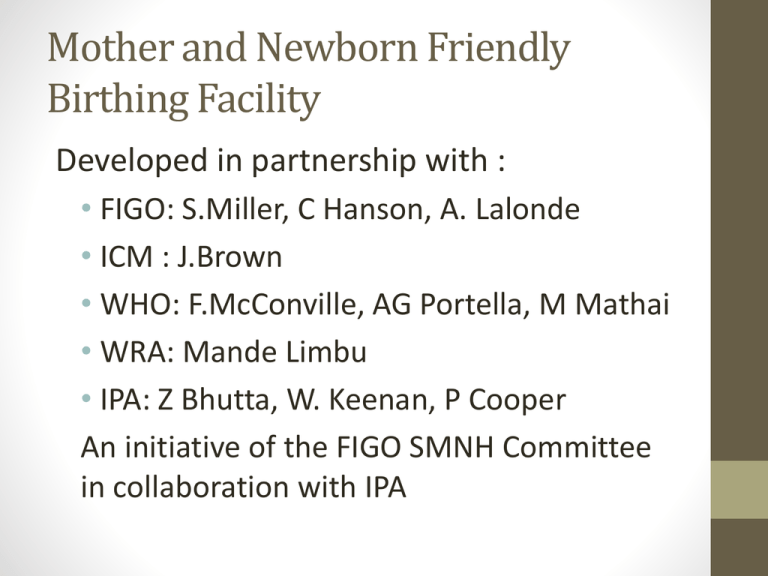
Mother and Newborn Friendly Birthing Facility Developed in partnership with : • FIGO: S.Miller, C Hanson, A. Lalonde • ICM : J.Brown • WHO: F.McConville, AG Portella, M Mathai • WRA: Mande Limbu • IPA: Z Bhutta, W. Keenan, P Cooper An initiative of the FIGO SMNH Committee in collaboration with IPA Whereas EVERY MOTHER/NEWBORN has the right to be treated with DIGNITY and RESPECT regardless of social status, including but not limited to : young, single, poor, uneducated, HIV+, minority. What has lead us to this Initiative • Unacceptable gap in MNM depending on access to quality care. • Right to positive birth experience and compassionate care. • Protection against unnecessary interventions and practice not respectful of the culture, bodily integrity, and dignity of MN • A positive birth experience is related to a healthy delivery outcome for mother and newborn Charter on the Universal Rights of Childbearing Women(URCBW • Foundation Document underlying initiative • Raise awareness of childbearing women’s inclusion in UN and other treaties. • Connection between human rights and quality maternity care Charter of Universal Rights of Childbearing Women • Increase capacity of MNH advocates to participate in Human Rights process • Align mothers entitlement to High-Quality MNC with International human rights and community standards • Hold MNC system and communities accountable to these rights 10 Criteria for WNFBF 1. Offers to all birthing women the opportunity to eat ,drink, walk ,stand, move and adopt her preferred positions in labor 2. Have clear non discriminatory policies on HIV+women, Family Planning and Youth services 3. Provide privacy in labor/delivery Criteria…. 4. Choice of person for labor partner 5. Culturally competent care 6. No physical, verbal, emotional or financial abuse during labor and delivery 7. Affordable costs, free maternity care if possible. Fees should be reasonable and posted. Inability to pay is not a reason to deny care, no detention of mother/baby Criteria….. 8. No routine practices which are not evidence-based. Adequate competent staff, policies for neonatal and maternal resuscitation, policy for transport and referral 9. Encourage, counsel, and educate staff to provide non pharma and pharma pain relief 10.Promote skin to skin mother baby contact, encourage to hold and breastfeed babies a soon as possible and provide combine care Process • All partners will work together to train individuals to conduct site visits, evaluate sites and recommend changes if necessary to qualify for certification • Facility certification will be for 3-5 year period, one year probation is possible for birthing unit that fulfills 80% of indicators and working to achieve others. Indicators matching Criteria 1. 2. 3. 4. Written policy on food, movement, labor positions. Info to women, posters, etc. Guideline implementation on HIV/AIDs, FP, Youth services. Privacy walls, curtains..mother /baby care combined Written policy for person of choice, encourage TBAs to participate in care of the women referred. Indicators…… 5. Written policy and posters on socio/cultural diversity 6. Written policy against abuse. Complaints policy established. Display Charter of Human Rights 7. Costs for delivery in line with national guidelines. No secondary payments for care. Costs /policy displayed on walls. 8. Interventions are evidence based within acceptable national/international ranges Indicators……. 9. Training of staff on pain relief, choice and monitoring of mother. Offer both pharma and non pharma pain relief. Chart review and patient survey. 10.Facilitate Skin to skin contact at birth, promote breastfeeding as soon as possible and facility provides combined care of mother/newborn. Enabling policies • The facility has a supportive human resource policy in place for recruitment and retention of all staff, ensures staff are safe and secure, enabled to provide quality of care • Exemption policy that protects dedicated and experienced labour ward staff (midwives, nurses and doctors) from being transferred to other departments Enabling Measures… • Women are supported and encouraged to have as normal a pregnancy and birth as possible, with evidenced-based interventions • Comfortable, clean, safe setting that promotes the wellbeing of women, families and facility staff • A physical environment (including safe water and clean sanitation ) that supports normal birth outcomes Implementation • ICM/FIGO/IPA will work with governments, national, local professional associations, UN agencies such as UNICEF/WHO/UNFPA/WB and WRA to implement this initiative. • All organizations can be equal partners in this effort . • Possible pilot project implementation in 12 countries. Conclusion • Look forward to ideas, suggestions about funding, implementation and collaboration • Special thanks to Dr. Suellen Miller and Claudia Hansen for their contribution to developing this initiative Andre lalonde MD alalonde1801@gmail.com FIGO SMNH committee Coordinator of MFBF working group SUMMARY OF INITIATIVE CRITERIA INDICATORS Adopt preferred positions in labor for women, provide food and beverage Written policy and implementation Non discriminatory policy for HIV+ women, FP and Youth services Implementation of guidelines for HIV+ women, FP and Youth services Privacy in labor / delivery Curtains, walls, etc. Choice of birthing partner Accommodation of partners Culturally competent care Training, posters, policies No physical, verbal, emotional and financial abuse Written policy, display Charter of Human Rights Affordable cost, free maternity care Costs in line with national guidelines No routine practice Evidence-based interventions Non-pharma and pharma pain relief Training on pain relief Skin to skin mother baby care, breastfeeding Provide combined care mother/baby, breastfeeding

